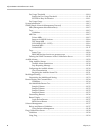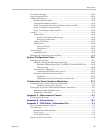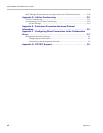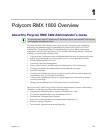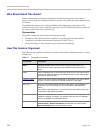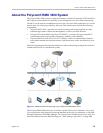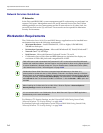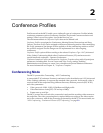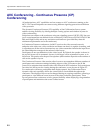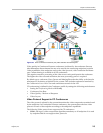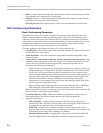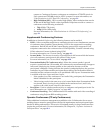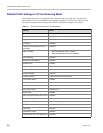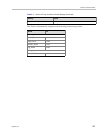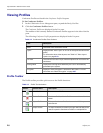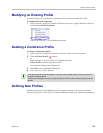
Polycom® RMX™ 1800 Administrator’s Guide
2-2 Polycom, Inc.
AVC Conferencing - Continuous Presence (CP)
Conferencing
All endpoints have AVC capabilities and can connect to AVC conferences running on the
MCU. AVC-based Endpoints can connect using different signaling protocols and different
video protocols.
The dynamic Continuous Presence (CP) capability of the Collaboration Server system
enables viewing flexibility by offering multiple viewing options and window layouts for
video conferencing.
Endpoints can connect to the conference using any signaling protocol (H.323, SIP), line rate
(up to a maximum line rate defined for the conference), Video Protocol (H.261, H.263, H.264
Base and High Profile) and at any resolution and frame rate (provided they meet the
minimum requirements set for the conference).
In Continuous Presence conferences, the MCU receives the video stream from each
endpoint at the video rate, video resolution and frame rate that it is capable of sending, and
it superimposes all the received streams into one video stream that includes the input from
the other endpoints arranges in the selected video layout.
Participants do not see themselves in the video layout. By Default, the speaker is shown in
the top left layout cell in symmetric layouts, in the larger cell in asymmetric layouts, or in
full screen. The speaker sees the previous speakers (their number depends on the number of
cells on the speaker’s layout.
The Continuous Presence video session offers layouts to accommodate different numbers of
participants and conference settings including support of the VUI annex to the H.264
protocol for endpoints that transmit wide video instead of 4CIF resolution. Each participant
can select his/her layout for viewing during the conference, as can be seen in Figure 2-1.
For conferences with more participants than display squares, the Collaboration Server
dynamic video mix capability allows the viewed sites to be modified throughout the
conference. The displayed layout can be changed during an ongoing conference, allowing a
participant to view different screen layouts of the other conference participants. These
layout options allow conferences to have greater flexibility when displaying a large number
of participants and maximizes the screen’s effectiveness.



